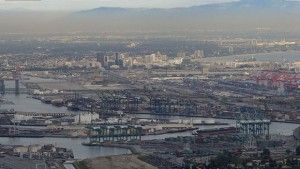Legislation to prevent port shutdowns passes U.S. Senate committee
 Although the nine-month labor dispute affecting 29 West Coast ports has officially come to a close, multiple industries in the U.S. are still reeling from the effect of the slowdown. Port gridlock along the West Coast left many exporters, manufacturers and retailers with logistic nightmares, and forced those companies to rethink their supply chain practices.
Although the nine-month labor dispute affecting 29 West Coast ports has officially come to a close, multiple industries in the U.S. are still reeling from the effect of the slowdown. Port gridlock along the West Coast left many exporters, manufacturers and retailers with logistic nightmares, and forced those companies to rethink their supply chain practices.
As reported by the National Retail Federation, “Ralph Lauren Chief Financial Officer Christopher Peterson said the company was relying more on air freight and routing more shipments to the East Coast. Toy brand LeapFrog said the slowdown delayed holiday shipments of its tablet computers; at one point, home décor importer Softline Home Fashions had $800,000 worth of merchandise on ships waiting for transport to Walmart, J.C. Penney and Bed Bath & Beyond.”
The dispute begs the question of what can be done to ensure the prevention of port shutdowns in the future. Some estimates show that the strikes and ongoing negotiations cost the U.S. economy a whopping $2.5 billion per day, and was potentially a significant factor in the lower-than-expected 0.2 percent GDP growth in the first quarter of 2015. Consulting firm Kurt Salmon pegs the total loss due to chronic congestion at $7 billion this year, with losses extending to $37 billion by the end of 2016.
Coming on the heels of this economic trauma, S. 1298, introduced by U.S. Sen. John Thune, R-S.D., aims to create a new level of transparency and accountability for ports, many of which are actually owned by the government. These sunshine reforms include requirements for:
- “The director of the Bureau of Transportation Statistics (BTS) to establish a port performance statistics program and report annually to Congress on the performance and capacity of the Nation’s key ports.
- “U.S. port authorities that are subject to federal regulation or that receive federal assistance to report annually to BTS.
- “The Secretary of Transportation, in consultation with the Secretaries of Labor and Commerce, to report to Congress on a port’s performance before and after the expiration of maritime labor agreements to help indicate whether labor discussions have impacted operations, the estimated economic impact of such disputes and roughly how long it will take for shipments to return to normal.”
“Every day, our nation’s businesses large and small depend on the efficient operation of U.S. ports,” said Sen. Thune in a prepared statement. “The recent labor dispute at West Coast ports underscored how a lack of data and transparency to quantify on-going problems at our ports can affect businesses from coast to coast. At present, statistics for air cargo and even forms of ground transportation are more developed and accessible than those for maritime transport. This legislation adds needed sunshine to maritime shipping through our ports to help head off future economically destructive impediments to commerce.”
Opposition to S. 1298
S. 1298 has been met with union opposition. In a letter addressed to the committee, the Transportation Trades Department, an arm of the AFL-CIO, urged a removal or modification to Section 4 of the bill, which mandates data collection on port performance leading up to and during labor negotiations. TTD President Edward Wytkind dubbed the section “anti worker” and wrote:
“This language would misuse statistics to tilt the balance against port workers in collective bargaining disputes and undermine the U.S. Department of Transportation’s Bureau of Transportation Statistics by needlessly politicizing the agency’s data collection process. …
“S. 1298 forces the agency to break from its historic practice by injecting the agency into labor-management relations, setting a damaging precedent that also threatens the utility of statistical collection in other modes under DOT supervision.”
Wytkind alleges that the mandate “is part of a broad and concerted legislative effort to diminish or eliminate the collective bargaining rights of maritime and longshore workers and their unions.”
Sen. Maria Cantwell, D-Wash., said during a hearing on Thursday, “the bill falls short in a couple of ways,” and that time would be better spent “actually improving what is our system to ship products” rather than “collecting all of this data and information.”
Sen. Joe Manchin, D-W.Va., expressed concern that this would “set the stage for improper federal intervention in the collective bargaining process.” He said the bill applies “arbitrary metrics that do nothing to address some of the real issues at ports, like the need to invest in new infrastructure, adapt to the larger vessels that are coming through the canal and protect against impacts of climate change.”
Though Sen. Manchin introduced an amendment to strike Section 4 out of the bill, the motion was defeated.
Importance of port data collection
Sen. Thune reiterated that the mandate “does not affect collective bargaining” and is in fact data that the DOT had previously requested but was unable to receive because there was no previous tracking.
A letter addressed to the committee from a large coalition manufacturers, exporters, retailers and agribusiness units emphasized their support for S. 1298, calling the bill “an important first step to truly gain visibility into how U.S. ports are operating.”
“We believe that establishing a port performance measurement and reporting program based on sound data will enable the responsible federal agencies to prepare meaningful annual reports on the performance and capacity of the nation’s key ports. Port performance data that facilitates rigorous analysis of America’s port business is an essential element in ensuring the nation’s commerce continues to flow efficiently.”
They pointed to periodic highway “Condition and Performance” reports based on data collected and issued by the Federal Highway Administration, which are “a model for the kind of statistical information that should be developed to assess U.S. port performance.”
In defending the importance of port data, Sen. Cory Gardner, R-Colo., voiced his support as a cosponsor of the bill, saying “we need to know the true economic impact that this has and how is it hurting our economy.” He also expressed concerns on how, in five years from now, when the latest labor agreements expire, “we need these numbers to understand what’s at stake economically.”
S. 1298 passed the Senate committee on Thursday.
Related Articles
CA kickstarts Musk’s new battery empire
With now-customary flair, Tesla chief Elon Musk announced his company’s latest foray — this time, into residential and commercial battery
California pension funds pushed by politicians to divest from gun industry
SACRAMENTO – California’s two major pension funds, the California Public Employees’ Retirement System (CalPERS) and the California State Teachers’ Retirement
Judiciary establishment shuns cost-cutting as alleged overspending continues
The state’s Judicial Council plans to shutter one of its satellite offices in 2017 but refuses to heed other cost-cutting




